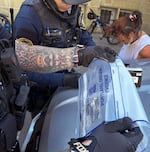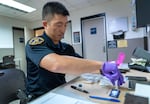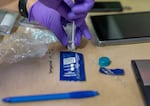
Portland Police Officer Donny Mathew checks a timer on his phone, waiting for treatment providers to arrive after arresting a woman for drug possession in downtown Portland, Sept. 10, 2024.
Kristyna Wentz-Graff / OPB
Downtown Portland buzzed with a midday blend of construction bangs, the whizz of cars and bikes and office workers stepping outside on a sunny September day for lunch.
Portland Police Officer Donny Mathew swung his leg off his city issued mountain bike before arresting Amber. OPB is only using her first name because she was using drugs and unable to consent to speak on the record.
Her alleged crime: drug possession.
Using the hood of a police cruiser as a makeshift laboratory in the middle of the street, Portland Police, who were joined by Oregon State Troopers, tested the drugs for fentanyl.
“It’s positive,” Mathew said as he reviewed the results. He turned to Amber who stood, looking down at the ground, hands handcuffed behind her back.
Before Sept. 1, a stop like this would have amounted to a citation and a $100 fine.
Now, as Mathew explained, Oregon’s new drug possession law comes into play.
Oregon lawmakers passed House Bill 4002 earlier this year. The bipartisan legislation implemented new criminal penalties for drug possession and ended the state’s three-year experiment with drug decriminalization.
In the month since the law passed, more than 1,129 people have been arrested for drug possession and possession-related charges, according to state data. The legislation also allows law enforcement to deflect drug users away from the criminal justice system and into treatment as a way to avoid charges.
It’s still too early to tell how well deflection is going to work across Oregon. Amber is among the first people eligible for deflection — and every county in Oregon is handling drug recriminalization a little differently.
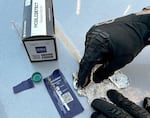
Portland Police officers use a fentanyl test kit during an arrest for drug possession in downtown Portland, Sept. 10, 2024.
Conrad Wilson / OPB
“You can either go to jail today for the possession of fentanyl,” Mathew told Amber. “Or we can call for deflection, which is some social workers that will come out that have had prior addiction problems as well in the past, and they come out and talk to you and you don’t get charged. So you get treatment. It’s like a treatment option instead of going to jail.”
In Multnomah County, you can only get into deflection if drug possession is your only charge and you don’t have outstanding warrants.
Amber qualifies for the program. She also seems anxious about what might happen next. She tells Mathew, almost in a whisper: “I’d love to talk to someone.”
Just before he makes the call, Mathew warns Amber if the treatment providers don’t arrive within 30 minutes, she’ll have to go to jail, according to Portland Police Bureau policy.
Amber moves to sit on the curb, still in handcuffs. If deflection workers show up in time, the bracelets will come off and she’ll begin a different challenge: getting into drug treatment.
After Mathew hangs up he starts a 30-minute timer on his iPhone.
And they wait.
“The downside of deflection is this wait. I mean, we’re tying up all of this, these resources while we wait for deflection,” said Portland Police Sgt. Jerry Cioeta, who leads one the city’s bike squads.
“Unfortunately for her, even though she qualifies for deflection, we don’t even know if deflection is an option for her, not because of anything she’s done or we’ve done. It’s the system.”

Treatment providers from 4D Recovery arrive, and the woman is released from police custody after being arrested for drug possession in downtown Portland, Sept. 10, 2024. The woman was eligible for deflection, an option where people who qualify may receive services and information about treatment in lieu of entering the criminal justice system.
Kristyna Wentz-Graff / OPB
A few minutes pass and a deflection team from 4D Recovery, a nonprofit drug treatment provider, arrives on the scene.
Mathew said it’s the first time anyone he’s arrested has been eligible for deflection.
As the handcuffs come off, the team from 4D joins Amber on the curb and gets to work. They introduce themselves and ask her how she’s doing. After a few minutes, they have a plan.
“Sounds like she’s agreed to work with us to get her into detox,” Mina Gilson from 4D said after a few minutes. “So that’s what we’re going to do.”
Amber is one of the roughly 70 people who have been deflected in Multnomah County since Oregon recriminalized drug possession.
Efforts to connect people in real time with treatment services have been an experiment in trial and error.
Each county is approaching the new law differently.
In some, county officials are using elements of the criminal justice system to enforce the new drug law and get people connected to treatment services, like community court. While others, such as Multnomah County, plan to open an entirely new facility where police can take people caught with small amounts of drugs and help them access treatment outside of courtrooms and the jail.
But in August, just days before Oregon’s new drug law went into effect, county leaders said they would delay the deflection center’s opening so it could hire staff and finish remodeling.
In the interim, 4D Recovery has helped fill the gap with mobile deflection to give police an option other than jail.
“You go from decriminalizing everything and telling the cops to be hands-off and then come back around and tell them to be hands-on and to go work with community partners to implement deflection,” said Tony Vezina, 4D’s executive director. “In that sense it is a little chaotic.”

Tony Vezina, 4D’s executive director, at Park Blocks on Portland, Sept. 3, 2024.
Kristyna Wentz-Graff / OPB
Vezina, who spoke about his experience in recovery, said there’s a point with addiction where people use against their will. He said he supports the change in Oregon’s law and wants providers such as 4D help law enforcement get people into treatment.
“We want to support them and take some of the burden off of their shoulders so they can respond to more emergencies and legitimate threats,” Vezina said. “We can work with the drug addicts. Leave that to us. We’re good at that.”
Drug deflection center opens
Just as counties are working to implement Oregon’s new drug law, Multnomah County’s drug deflection center — the Coordinated Care Pathway Center — is itself a work in progress.
Even after its delay, it overcame a last minute legal challenge before it could open on Monday in inner Southeast Portland. Stakeholders hope any chaos starts to subside soon.
A Multnomah County Circuit Court judge on Friday, declined a request from a nearby preschool, Escuela Viva Community School, to block the facility from opening.
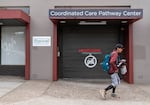
Multnomah County’s Coordinated Care Pathway Center, Oct. 11, 2024, in Southeast Portland.
Kristyna Wentz-Graff / OPB
In the days leading up to its opening, final touches were still being completed. The open room under fluorescent lighting had a makeshift nurses station and several large chairs that look like La-Z-Boys.
Only law enforcement can take people here — where they’ll get a medical exam and make a plan for what’s next.
“This is going to be like a triage center,” said Bernard Gyebi-Foster, CEO of Tuerk House, a Baltimore-based nonprofit treatment provider that will run the deflection center.
“They come here, we find out what their needs are, then we triage to where they need to go. There may not be availability for them to get there.”
Hiring has been a challenge, Gyebi-Foster said. The facility will be initially staffed with 14 people, including a nurse practitioner and other nurses who have moved from Arizona, Texas and Georgia, he said. There’s also several on-site security staff.
Gyebi-Foster said he was struck by the dearth of treatment providers, such as residential treatment beds, in Oregon.

“This is going to be like a triage center,” said Bernard Gyebi-Foster, CEO of Tuerk House, a Baltimore-based, nonprofit treatment provider that will run Multnomah County’s Coordinated Care Pathway Center, Oct. 11, 2024.
Kristyna Wentz-Graff / OPB
“I thought Baltimore was bad and then I came here,” he said during a tour of the center. “Baltimore is heaven.”
He is aware of the pressure that both the county and the state are under to get a handle on the addiction crisis and provide more treatment services.
“I know you are worried about public safety, but this problem has been here for a minute,” Gyebi-Foster said. “One day, six months of us doing the deflection center is not going to change that. But we are beginning to make those incremental changes.
“Addiction is a beast,” he added. “Addiction is debilitating.”
In order to help those struggling with substance use disorders, Gyebi-Foster said it’s going to take time. And they need the public’s patience to do that.



